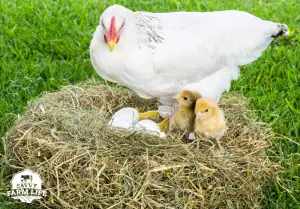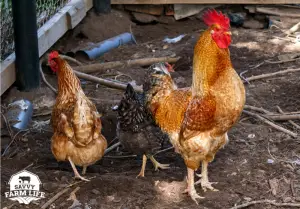Do Roosters Lay Eggs? What You Need to Know
Chickens are the perfect birds to raise if you are new to poultry and would like to start an egg-laying flock. For someone unfamiliar with chickens, the amount of information can seem overwhelming, and can quickly make your head spin with all of the terminology, advice, guidelines, and general information. Before you get into the details, it’s important to go back to the basics. What is the difference between a rooster and a hen? Are hens the only ones who lay eggs, or will your rooster lay eggs as well?
So, do roosters lay eggs? A rooster is a mature male chicken, and does not lay eggs. As is the case for most other species, eggs are exclusively produced by the females of the flock, regardless of whether there is a rooster present. When it comes to eggs, the rooster’s job lies solely in the fertilization.
If you are considering raising a flock of chickens, it is important to understand how gender affects egg-laying, how eggs are fertilized, and the advantages and disadvantages of having a rooster.
Rooster or Hen: Chicken Terminology 
You will hear a lot of different terms when it comes to chickens, so let’s start with the basics. “Chicken” is the name of the species – a chicken can be either a male or a female, just as a “human” can be either a male or a female. Most chicken breeds of standard size can be “sexed” (inspected with the objective of determining the gender) as early as one day from hatching. An immature male chicken is called a “cockerel”, while an immature female chicken is called a “pullet”.
When you purchase chicks from the feed store, they are often only days old and will be labeled as “pullets” or “straight-run”. Pullets are females, while “straight-run” simply means they have not been sexed. Straight-run chicks are, on average, 50% male and 50% female. If you purchase straight-run chicks, anticipate having a few roosters in the near future.
Both cockerels and pullets reach sexual maturity by around 5 months of age. The male will have a distinct crow by this age, and the female will begin laying eggs. Once a cockerel has reached sexual maturity, he is called a “rooster”. Once a pullet has reached sexual maturity, she is a “hen”. While hens are responsible for the laying of eggs, you need a rooster to fertilize the eggs if you want to raise chicks.
Roosters Are Required For Egg Fertilization
If you would like to hatch your own chicks, you will need to either purchase fertilized eggs, or you will need to keep a rooster with your flock. Most roosters are prolific breeders, and have no qualms about doing their part in procreation – young roosters will mate with their hens up to 30 times in a day. Sometimes they have favorites, and those favorites will make themselves obvious with the bald spots on the backs of their necks (where the rooster holds on with his beak).
Roosters, like most male birds, do not have penises. Instead, a rooster has what is called a papilla located inside of his vent (the vent is the exit for everything inside the bird, both feces and eggs). A papilla is a small “bump” that must touch a hen’s cloaca (inside the opening of the vent) in order to release the semen. Once the sperm has entered the hen, it will travel upward, fertilizing the egg. Once the rooster mounts the hen, the mating act takes only seconds.
Will Hens Lay Eggs Without A Rooster Present?
If you would like fresh eggs but don’t want to bother with a rooster, don’t fret. Female chicks are born with a finite number of eggs, and these eggs are expelled on a regular basis regardless of the presence of a rooster. Fertilization is the only impact a rooster has on the hen’s eggs – they do not at all affect the number of eggs laid.
Can You Eat A Fertilized Egg? 
The question of whether you can eat a fertilized egg comes up frequently. The answer to that question is, absolutely. A fertilized chicken egg needs a specific degree of warmth before a chick will begin forming – this warmth is usually provided by a broody (mother-minded) hen. If you are collecting eggs daily, even from a broody hen, you will stop the creation process before a chick even begins to develop. As far as consumption is concerned, there is no notable difference between an unfertilized egg and a fertilized egg, so long as the fertilized egg was not sitting under a broody hen for a week.
Of course, you can also eat a fertilized egg with a developed embryo within, and it is a popular Filipino delicacy. This is called “balut” and once the fertilized egg has been incubated for 14-18 days, it is boiled and eaten. There is a noticeable small chick (or duckling, when the balut is made with a duck egg) in the center that has been cooked. It is often considered a “superfood”, though whether or not it is actually a healthy food is debatable (it’s healthy fat is good for the brain, but it is quite high in cholesterol).
Disadvantages Of Having Roosters
Many operations, small and large, raise flocks of laying hens without roosters. There are a couple of reasons for this.
Roosters crow. Their crows are loud. Many chicken keepers would prefer not to deal with the crowing of a rooster, for the sake of their neighbors or for the sake of their sweet, uninterrupted sleep. Roosters are depicted in cartoon shows and movies as the farm animal that welcomes the sunrise with his famous “cock-a-doodle-doo”. The truth is, roosters crow all day long – they crow when there is a lot of activity going on, they crow when they are peaceful, they crow when they are watching the sky, and they crow when the neighbor’s dog barks.
No one really knows the reason that roosters crow, but many theorize the purpose of the crow is to announce to the flock that “everything’s okay”. The other myth is that the rooster crows with the sunrise. Unfortunately, most roosters start crowing well before the sun rises – as early as 2:00 or 3:00 in the morning.
The other reason some homesteads choose not to have roosters is simple economics. Why spend money and precious space feeding and housing a rooster who offers no tangible benefits to your operation? After all, large egg-producing operations do not use roosters at all, except in the breeding of the laying hens themselves.
Benefits Of Having Roosters 
If you have a flock of laying hens and you have the space to accommodate a rooster and his noise, it is worth looking into keeping a rooster.
Of course, one of the benefits will be that you will have fertilized eggs. If you want to do nothing with your eggs but eat them, that’s fine – you can eat fertilized eggs just like you can eat unfertilized eggs. But if you have a rooster, you can decide later to hatch a clutch of fertilized eggs if you have the desire.
The biggest benefit of keeping a rooster for most would be for the protection he offers. A rooster’s goal in life (besides procreation) is protecting his flock. Roosters have been known to stand up to foxes, coyotes, and even hungry dogs. Even if he ultimately loses his life in a fight for his flock, he will have given the hens time to find cover.
Just as important as the actual security that a rooster offers is the felt security that he provides. Hens with a rooster in the flock feel more secure, they are more relaxed, and they suffer less stress. If you have raised flocks both with and without a rooster, you will know the (positive) difference in the flock’s atmosphere.
Another advantage of having a (single) rooster is the reduction in squabbles. Hens, particularly those at the top of the pecking order, will squabble with others over just about anything. There is more peace in the flock when a rooster is present, and fewer fights will break out among the hens.
When two hens find themselves in a disagreement, the rooster will usually come between them until they have separated. He will bring harmony to the flock. Interestingly, it is not unheard of for the leader hen of a female-only flock to begin exhibiting rooster-like behavior, mounting other hens and even emitting crowing sounds. Once a rooster is introduced, this behavior stops and the dominant hen will usually settle down.
A Rooster Has His Place In The Flock
While roosters will not provide you with eggs, there are many benefits they can offer the flock that are often overlooked. He may not be biologically able to contribute to the eggs in the coop, but he can offer both protection and harmony within the coop and run. Though not tangible contributions, they are mighty, and the addition of a rooster will help to create a happy, well-rounded flock of chickens.

